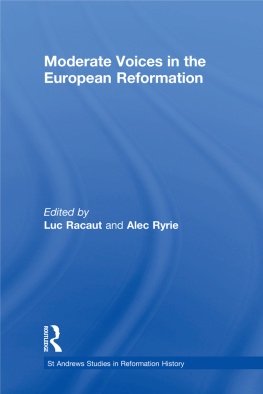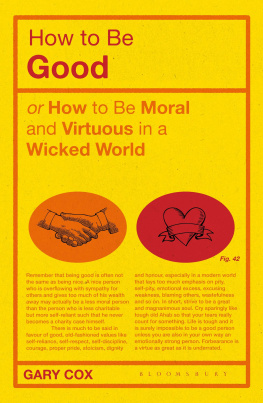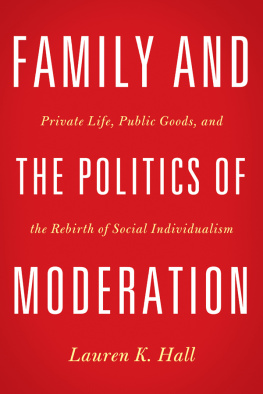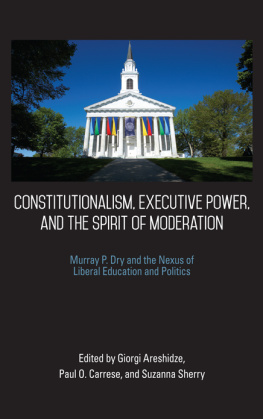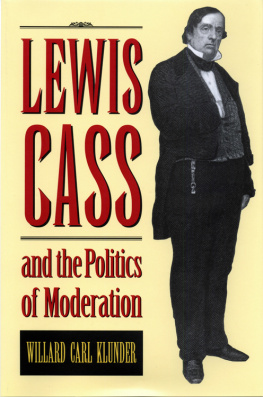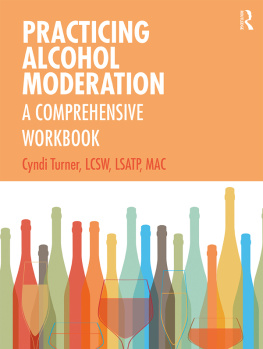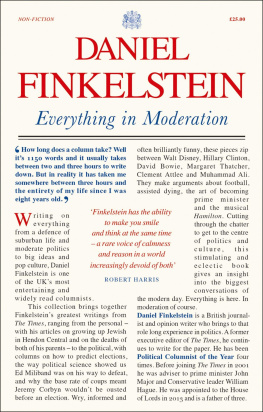Faces of Moderation
FACES OF MODERATION
The Art of Balance in an Age of Extremes
Aurelian Craiutu

A volume in the Haney Foundation Series, established in 1961 with the generous support of Dr. John Louis Haney.
Copyright 2017 University of Pennsylvania Press
All rights reserved. Except for brief quotations used for purposes of review or scholarly citation, none of this book may be reproduced in any form by any means without written permission from the publisher.
Published by
University of Pennsylvania Press
Philadelphia, Pennsylvania 19104-4112
www.upenn.edu/pennpress
Printed in the United States of America on acid-free paper
1 3 5 7 9 10 8 6 4 2
Cataloging-in-Publication Data is available from the Library of Congress.
ISBN 978-0-8122-4876-0
Our world does not need tepid souls. It needs burning hearts, men who know the proper place of moderation.
Albert Camus
CONTENTS
People offer advice, but they do not give at the same time the wisdom to benefit from it.
La Rochefoucauld
Many may still remember Barry Goldwaters famous words on the occasion of his nomination acceptance speech at the Republican National Convention in San Francisco in 1964: I would remind you that extremism in the pursuit of liberty is no vice. And let me remind you also that moderation in the pursuit of justice is no virtue. After pronouncing these memorable words, Goldwater gracefully accepted the nomination of his party and went on to score a massive defeat at the polls. His extreme defense of liberty was seen by many in tension with his opposition to the Civil Rights Act, and this contradiction (in addition to other things, of course) was enough to send Goldwater to the ranks of political losers.
Nonetheless, it would be difficult not to have some sympathy for his immoderate position in defense of liberty at a critical moment during the Cold War when the fate of freedom in the world was uncertain, to say the least. We would be mistaken to characterize it, to use Senator William Fulbrights own words, as the closest thing in American politics to an equivalent of Russian Stalinism. Goldwater was none of that, to be sure; he was an American patriot who believed in his countrys mission to spread liberty in an embattled world during the Cold War. I have no intention of reassessing Goldwaters legacy here. I begin with his critique of moderation because in my view, it misrepresented in an unforgettable way a cardinal virtue without which our political system would not be able to function properly. This understudied and underappreciated virtue deserves a closer look to reveal its nature, complexity, and potential benefits.
This is precisely what I hope to achieve in the present book, which is part of a larger multivolume research agenda whose main goal is to bring to light the richness of political moderation in the history of modern political thought. The concept of moderation was already present, as it were, between the lines in my first book, Liberalism Under Siege: The Political Thought of the French Doctrinaires (2003). It came to the fore in a subsequent volume, Elogiul moderaiei (In Praise of Moderation), written for a general public and published in Romanian in 2006. Six years later, in A Virtue for Courageous Minds: Moderation in French Political Thought, 17481830, I began exploring in detail the tradition of political moderation in France (a second volume covering the period 18301900 in France will follow in due course). I argued that political moderation constitutes a coherent, complex, and diverse tradition of thought, an entire submerged archipelago that has yet to be (re)discovered and properly explored. This archipelago consists of various islands represented by a wide array of ideas and modes of argument and action; at the same time, it also includes elements and political strategies that were not shared by all moderates, or were shared only to varying degrees. The book ended (rhetorically) with a Decalogue of Moderation that emphasized the complexity, difficulty, and richness of this virtue. I argued that, far from being of mere historical interest, moderation may be particularly relevant in a postCold War age such as ours because it enables us to deal with the antinomies and tensions at the heart of our contemporary societies and allows us to defend the pluralism of ideas, principles, and interests against its enemies. I also insisted that moderation should be regarded as an eclectic virtue transcending the conventional categories of our political vocabulary. While moderation may sometimes imply a conservative stance embraced by those who seek to preserve the status quo, it would be inaccurate to claim that all calls for moderation are little else than conservative or reactionary attempts to maintain unjust social and political privileges or components of an ideological system by which modern elites seek to legitimize their power and domination.
The present volume has a different emphasis and examines select faces of political moderation in the twentieth century. It pays special attention to its shifting polemical and rhetorical uses in different political and national contexts and addresses the following questions: What did it mean to be a moderate voice in the political and public life of the past century? How did moderate minds operate compared to more radical spirits in the age of extremes? What
This volume does not aim to benor should be seen asa work of political contestation; it is first and foremost a work in modern intellectual history, history of ideas, and political theory that contributes to contemporary debates on political virtues, radicalism, and extremism. Without treating moderation as a unitary block, I show its heterogeneity and diversity by focusing on the writings of representative authors (mostly European, with a few American exceptions) who defended their beliefs in liberty, civility, and moderation in an age when many intellectuals shunned moderation and embraced various forms of radicalism and extremism. Although their political and intellectual trajectories were significantly different, these thinkers may be seen as belonging to a loosely defined school of moderation that transcends strict geographical and temporal borders. I insist at the outset that there is no ideology (or party) of moderation in the proper sense of the word and that moderation cannot be studied in the abstract, but only as instantiated in specific historical and political contexts and discourses. What is moderate in one context and period may significantly differ from what is moderate at another point in time, which is another way of saying that moderation is not a virtue for all seasons and for everyone.
In treating such a complex subject as moderation, it is necessary to be as ecumenical as possible and examine a wide cast of characters including thinkers from all aisles of the political spectrum and from both sides of Europe (West and East). The last detail is particularly relevant today when the memory of the Cold War seems to be revived by recent political developments in Russia and the Middle East. Since the main focus of the book is on European political thought, the least represented here is the American political tradition. Nevertheless, the brief discussion of Judith Shklars liberalism of fearwhom were of European extraction, brought important contributions to the debates on moderation and extremism in the twentieth century.
We will explore both well-known authors (such as Isaiah Berlin, Raymond Aron, and Michael Oakeshott) and lesser-known ones (such as Norberto Bobbio, Leszek Koakowski, and Adam Michnik) whose selected writings had something important to say about political moderation in an age of extremes. Taken together, these thinkers do not offer a comprehensive account of this virtue, and the reader might wonder, for example, whether other major figures such as Hannah Arendt, Albert Camus, or John Maynard Keynes should not have been examined as well. Needless to say, there is no shortage of worthy candidates. One thing is certain though: we need an open and ecumenical form of intellectual history, one that takes into account the creativity of both well-known and allegedly marginal authors whose works can illuminate the complexity and richness of the tradition of political moderation in the twentieth century.
Next page

